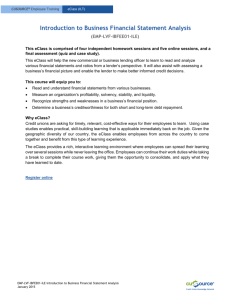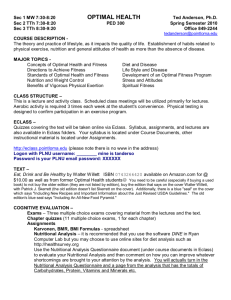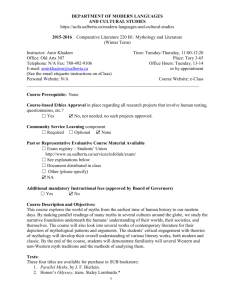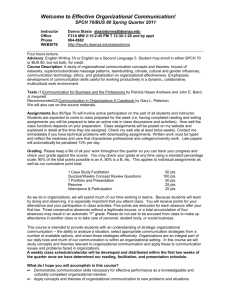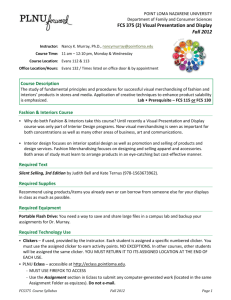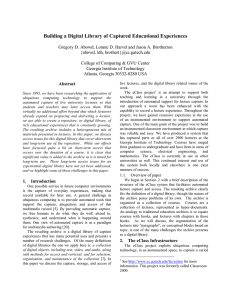Point Loma Nazarene University
advertisement
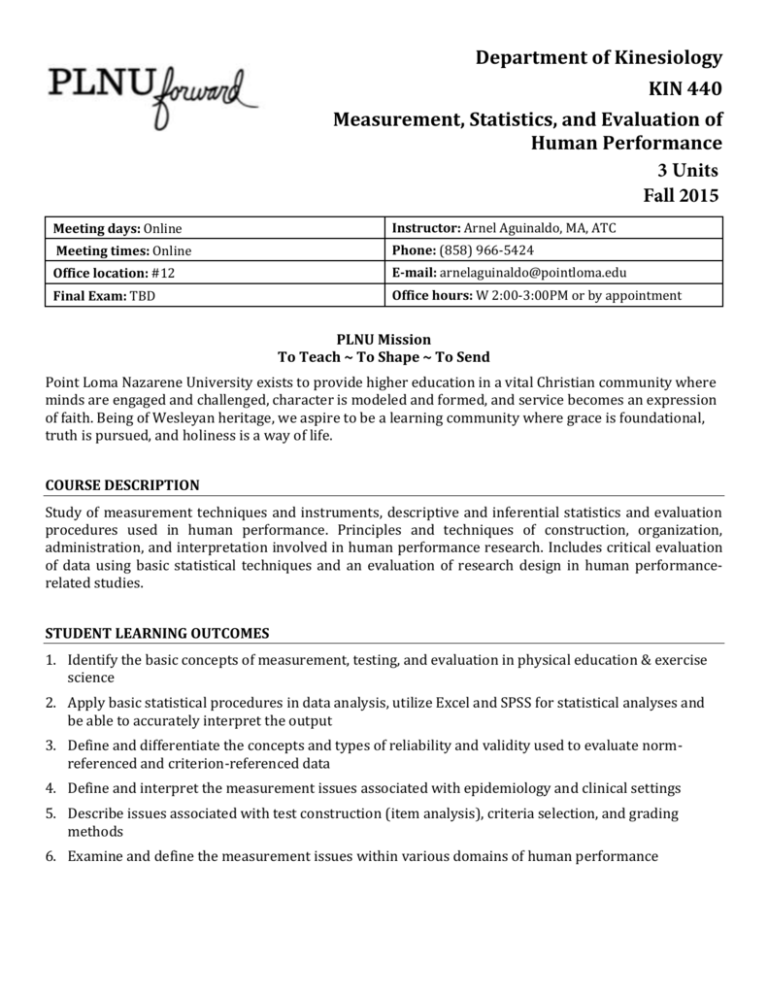
Department of Kinesiology KIN 440 Measurement, Statistics, and Evaluation of Human Performance 3 Units Fall 2015 Meeting days: Online Instructor: Arnel Aguinaldo, MA, ATC Final Exam: TBD Office hours: W 2:00-3:00PM or by appointment Meeting times: Online Office location: #12 Phone: (858) 966-5424 E-mail: arnelaguinaldo@pointloma.edu PLNU Mission To Teach ~ To Shape ~ To Send Point Loma Nazarene University exists to provide higher education in a vital Christian community where minds are engaged and challenged, character is modeled and formed, and service becomes an expression of faith. Being of Wesleyan heritage, we aspire to be a learning community where grace is foundational, truth is pursued, and holiness is a way of life. COURSE DESCRIPTION Study of measurement techniques and instruments, descriptive and inferential statistics and evaluation procedures used in human performance. Principles and techniques of construction, organization, administration, and interpretation involved in human performance research. Includes critical evaluation of data using basic statistical techniques and an evaluation of research design in human performancerelated studies. STUDENT LEARNING OUTCOMES 1. Identify the basic concepts of measurement, testing, and evaluation in physical education & exercise science 2. Apply basic statistical procedures in data analysis, utilize Excel and SPSS for statistical analyses and be able to accurately interpret the output 3. Define and differentiate the concepts and types of reliability and validity used to evaluate normreferenced and criterion-referenced data 4. Define and interpret the measurement issues associated with epidemiology and clinical settings 5. Describe issues associated with test construction (item analysis), criteria selection, and grading methods 6. Examine and define the measurement issues within various domains of human performance REQUIRED TEXTS AND RECOMMENDED RESOURCES Morrow, J. R., Jackson, A. W., Disch, J. G., & Mood, D. P. (2011). Measurement and Evaluation in Human Performance (4th Ed.). Champaign, IL: Human Kinetics. ISBN-10: 0736090398, ISBN-13: 9780736090391 (eBook is available at http://www.HumanKinetics.com/MeasurementAndEvaluationInHumanPerformance) Handouts will be provided throughout the semester via Eclass. PASW (SPSS) and Excel software ATTENDANCE AND PARTICIPATION Regular and punctual attendance at all classes is considered essential to optimum academic achievement. If the student is absent from more than 10 percent of class meetings, the faculty member has the option of filing a written report which may result in de-enrollment. If the absences exceed 20 percent, the student may be de-enrolled without notice. If the date of de-enrollment is past the last date to withdraw from a class, the student will be assigned a grade of W or WF consistent with university policy in the grading section of the catalog. Although attendance will be rarely taken, there is a strong negative correlation between number of absences and grade percentage in this class. INCOMPLETES AND LATE ASSIGNMENTS All assignments are to be submitted/turned in by the beginning of the class session when they are due—including assignments posted in Eclass. Late work (turned in any time after the due date and time) may be turned in until the last day of class, for a maximum of 50% credit (this is a still a failing grade but is better than zero points). Missed exams may ONLY be made up with a legal, written excuse. A missed exam for an approved reason MUST be completed prior to returning to the next class meeting. ACADEMIC DISHONESTY Students should demonstrate academic honesty by doing original work and by giving appropriate credit to the ideas of others. As stated in the university catalog, “Academic dishonesty is the act of presenting information, ideas, and/or concepts as one’s own when in reality they are the results of another person’s creativity and effort. Such acts include plagiarism, copying of class assignments, and copying or other fraudulent behavior on examinations. A faculty member who believes a situation involving academic dishonesty has been detected may assign a failing grade for a) that particular assignment or examination, and/or b) the course.” See Academic Policies in the undergrad student catalog. ACADEMIC ACCOMMODATIONS While all students are expected to meet the minimum academic standards for completion of this course as established by the instructor, students with disabilities may require academic accommodations. At Point Loma Nazarene University, students requesting academic accommodations must file documentation with the Disability Resource Center (DRC), located in the Bond Academic Center. Once the student files documentation, the Disability Resource Center will contact the student’s instructors and provide written recommendations for reasonable and appropriate accommodations to meet the individual needs of the student. See Academic Policies in the undergrad student catalog. KPE 440 Page 2 Spring 2013 FERPA POLICY In compliance with federal law, neither PLNU student ID nor social security number should be used in publically posted grades or returned sets of assignments without student written permission. This class will meet the federal requirements by (each faculty member choose one strategy to use: distributing all grades and papers individually; requesting and filing written student permission; or assigning each student a unique class ID number not identifiable on the alphabetic roster.). Also in compliance with FERPA, you will be the only person given information about your progress in this class unless you have designated others to receive it in the “Information Release” section of the student portal. See Policy Statements in the undergrad student catalog. FINAL EXAMINATION POLICY Successful completion of this class requires taking the final examination on its scheduled day (May 1, 2013). No requests for early examinations or alternative days will be approved. USE OF TECHNOLOGY Point Loma Nazarene University encourages the use of technology for learning, communication, and collaboration. It is the responsibility of the student to confirm access to the essential applications needed for the class such as PASW (SPSS) and Excel as well as standard online research tools. ASSESSMENT AND GRADING Assignments: Students will complete six assignments, most of which will be completed utilizing Excel and/or PASW statistical software. Write ups need to be submitted via Eclass before class on the due date (see course schedule). Each assignment is worth 10 pts (60 pts total). Exams: The 3 scheduled exams will NOT be cumulative per se. However, students should be aware that the material in this class builds upon itself, so that exam questions may require knowledge of earlier material for a complete answer. Exams will be administered online through Eclass. Each exam is worth 60 pts (180 pts total). Research Project: Students will complete a statistical analysis project using data they collect as a group. Students may choose a small group (up to 3 students total), determine a research question with a simple fitness test component, administer the test, collect and analyze the data, and complete a scientific write up. Each group will present their project to the class as part of their project grade. Specific guidelines for the project will be given after Exam 2. The project is worth 60 pts. KPE 440 ASSESSMENT POINTS COURSE OBJECTIVES Exam #1 Exam #2 Exam #3 Assignments Group Project ------------------Total 60 60 60 60 60 ------300 1,2 3,4 5,6 1-6 1,2,3,6 Page 3 Spring 2013 KPE 440 POINTS GRADE POINTS GRADE 278-300 269-277 260-268 251-259 242-250 233-241 A AB+ B BC+ 224-232 215-223 206-214 197-205 188-196 0-187 C CD+ D DF Page 4 Spring 2013 COURSE SCHEDULE AND ASSIGNMENTS Updated 1/7/2013 (schedule is subject to change depending on students and instructor’s needs) DATE 1/9 1/16 1/23 1/30 2/6 IN CLASS Introduction Nature & purpose of measurement & evaluation Domains of human performance Measurement scales Summation notation Descriptive statistics Frequency Distribution (histograms) Central tendency Variability Standard scores Lab in class (descriptive stats) Correlation Coefficient Coefficient of Determination Prediction Lab in class (descriptive stats, correlation, prediction) Hypothesis testing Independent & dependent variables Inferential Statistics (Chi-square, t-tests, ANOVA) Lab in class (inferential stats) EXAM 1 (Course Objectives 1,2: Ch. 1-5) 2/13 Norm-referenced measurement Reliability 2/20 Reliability Validity Lab in class Criterion referenced measurement Lab in class (Assignment 4 part I) 2/27 3/6 3/13 3/20 3/27 4/3 KPE 440 TEXT / ASSIGNMENT WORK DUE pp. 3-15 pp. 37-40 pp. 40-54 pp. 55-65 Assignment 1: Descriptive stats, Correlation & Prediction pp. 69-83 Assignment 2: Inferential stats 1/30 Assignment 1 (submit to Eclass before class) 2/6 Assignment 2 (submit to Eclass before class) pp. 87-111 Assignment 3: Reliability and validity pp. 89-101 pp. 102-111 2/20 Assignment 3 (submit to Eclass before class) pp. 113-135 Assignment 4: Criterion-based reliability and validity NO CLASS - SPRING BREAK! Criterion-referenced standards in epidemiology Measurement issues in the clinical setting Diagnostic testing Review EXAM 2 (Course Objectives 3,4: Ch. 6-7) Test construction Internal consistency (KR20, KR21) Item analysis (IRT) Lab in class Body Composition Muscular Strength and Endurance Flexibility Research design and methods Group project pp. 131-132, handouts Assignment 5: Epidemiology & clinical testing 3/13 Assignment 4 (submit to Eclass before class) 3/20 Assignment 5 (submit to Eclass before class) pp. 140-186 Assignment 6: Item analysis pp. 201-223; handouts Page 5 4/3 Assignment 6 (submit to Eclass before class) Spring 2013 4/10 4/17 4/24 5/1 KPE 440 Group project data collection Data collection, analysis Data analysis, evaluation, discussion of write-up Writing day Presentation development Oral Presentation Day EXAM 3 (Course Objectives 5,6: Ch. 8-9) Page 6 5/1 Final paper due Spring 2013
